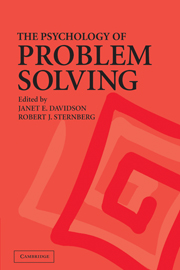Book contents
- Frontmatter
- Contents
- Contributors
- Preface
- PART I INTRODUCTION
- PART II RELEVANT ABILITIES AND SKILLS
- 3 Is Success or Failure at Solving Complex Problems Related to Intellectual Ability?
- 4 Creativity: A Source of Difficulty in Problem Solving
- 5 Insights about Insightful Problem Solving
- 6 The Role of Working Memory in Problem Solving
- 7 Comprehension of Text in Problem Solving
- PART III STATES AND STRATEGIES
- PART IV CONCLUSION AND INTEGRATION
- Index
- References
3 - Is Success or Failure at Solving Complex Problems Related to Intellectual Ability?
Published online by Cambridge University Press: 05 June 2012
- Frontmatter
- Contents
- Contributors
- Preface
- PART I INTRODUCTION
- PART II RELEVANT ABILITIES AND SKILLS
- 3 Is Success or Failure at Solving Complex Problems Related to Intellectual Ability?
- 4 Creativity: A Source of Difficulty in Problem Solving
- 5 Insights about Insightful Problem Solving
- 6 The Role of Working Memory in Problem Solving
- 7 Comprehension of Text in Problem Solving
- PART III STATES AND STRATEGIES
- PART IV CONCLUSION AND INTEGRATION
- Index
- References
Summary
INTRODUCTION
Imagine you are elected mayor of a town and are given absolute power over all town resources. You may hire workers for the local factory, raise taxes, have schools built, and close down local businesses. The one goal you are to strive for is to make certain that the town prospers.
A situation like this, simulated on a computer, was used in the early 1980s by Dietrich Dörner and his colleagues (e.g., Dörner & Kreuzig, 1983; Dörner, Kreuzig, Reither, & Stäudel, 1983) in Bamberg, Germany, to study individual differences in the human ability to solve complex problems. Dörner was interested in understanding why some of his research participants were much more successful in building prosperous towns than were others. One of his rather striking and hotly debated conclusions was that individual differences in the ability to govern the simulated town were not at all related to the individuals' IQs. Rather, an individual's ability to turn the town into a prosperous community seemed to be related to his or her extroversion and self-confidence.
In this chapter we are concerned with the question of what determines individual differences in complex problem-solving competence. The answer to this question may be traced from many different viewpoints: cognitive, social, biological, and evolutionary, to name just a few. Here, we focus on the contribution of cognitive psychology to providing an answer to the question.
- Type
- Chapter
- Information
- The Psychology of Problem Solving , pp. 87 - 126Publisher: Cambridge University PressPrint publication year: 2003
References
- 12
- Cited by



